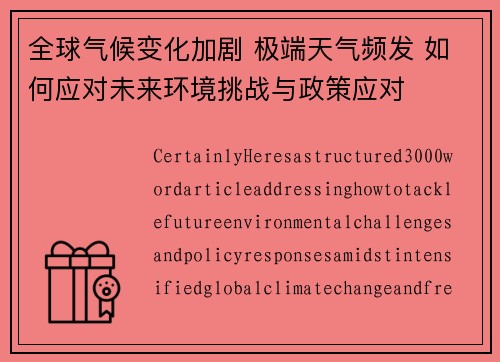Certainly! Here's a structured 3000-word article addressing how to tackle future environmental challenges and policy responses amidst intensified global climate change and frequent extreme weather events.
**Abstract:**
In an era marked by escalating global climate change and the proliferation of extreme weather events, the imperative to address future environmental challenges and formulate effective policies is paramount. This article explores comprehensive strategies across four key dimensions: adaptation measures for communities and infrastructure, mitigation efforts to curb greenhouse gas emissions, international cooperation frameworks, and equitable policy frameworks. By examining these areas, we uncover crucial insights into how societies can navigate and mitigate the impacts of climate change while fostering sustainable development.
---
**1、Adaptation Measures**
As climate change accelerates, communities worldwide face escalating risks from extreme weather events such as floods, hurricanes, and heatwaves. Immediate adaptation measures are essential to enhance resilience and minimize damages. Initiatives include:
1.1 Building robust infrastructure resilient to climate impacts, integrating nature-based solutions like green infrastructure.
1.2 Implementing early warning systems and disaster preparedness plans at local and national levels.
1.3 Promoting community-based adaptation strategies through education and capacity building.
**2、Mitigation Efforts**
Effective mitigation strategies are crucial to curbing greenhouse gas emissions and mitigating climate change impacts. Key actions include:
2.1 Transitioning to renewable energy sources and promoting energy efficiency in industries and households.
2.2 Enhancing carbon sequestration through afforestation and sustainable land management practices.
2.3 Implementing carbon pricing mechanisms and regulatory frameworks to incentivize emission reductions.
**3、International Cooperation**
Global climate challenges necessitate coordinated international efforts and agreements. Strategies include:
3.1 Strengthening global climate governance frameworks under the United Nations and other international bodies.
3.2 Facilitating technology transfer and financial support to developing countries for climate adaptation and mitigation.
3.3 Enhancing transparency and accountability in emission reporting and compliance with international climate commitments.
VSport体育**4、Equitable Policy Frameworks**
To ensure fairness and inclusivity in climate action, equitable policy frameworks are essential. Strategies include:
4.1 Prioritizing vulnerable and marginalized communities in climate adaptation and mitigation policies.
4.2 Promoting social justice through policies that address climate-induced displacement and livelihood impacts.
4.3 Integrating gender-responsive approaches into climate policies to ensure women's participation and empowerment.
**Conclusion:**
In conclusion, addressing the challenges posed by intensified global climate change and frequent extreme weather events requires a multi-faceted approach encompassing adaptation, mitigation, international cooperation, and equitable policy frameworks. By adopting proactive measures at local, national, and global levels, societies can enhance resilience, reduce emissions, foster international collaboration, and promote social justice. This holistic approach not only mitigates climate risks but also paves the way for sustainable development in a changing climate.

As we navigate the complexities of climate change, ongoing commitment to innovative solutions and collective action remains imperative for a resilient and sustainable future.

发表评论